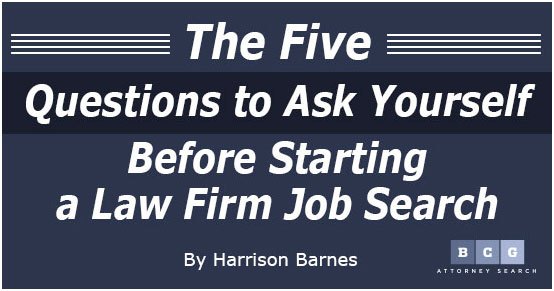
The road from admission into law school to joining the ranks at a successful law firm is long and arduous. Having worked hard and achieving what is considered "success," a young attorney can find that a sense of vague disappointment can often be overwhelming.

It can become difficult to determine the right time for you to consider other options, or even how to begin the process. Young lawyers who become dissatisfied with many aspects of their jobs and may want to contemplate a job search are often stymied by a variety of fears.

|
| Harrison Barnes |
To get past this confusion and to determine if a search is timely, you must assess your current situation, identify issues of concern, and possibly look at realistic alternatives. Only then can you decide if a search is worth the upheaval, anxiety and time commitment required.
The following five questions set forth a framework that, when answered candidly, will give you some clarity and focus as to whether it is the right time to engage in a job search.
Finally, if the questions posed seem too difficult to address alone, a good legal recruiter can either walk you through this process or refer you to a career counselor who can.
1. WHAT ARE MY CONCERNS?
Since any change is replete with challenge and effort, the first step is to methodically analyze the issues that concern you. We have divided this question into two stages.
- First: Consider the work you are getting. Do you want more varied work or would you prefer to specialize? How important is it for you to work on the most sophisticated, "cutting edge" matters? Is there a particular industry sector that is appealing to you that you may not have access to? Do you want more international or domestic work? Would you prefer more or less of an institutional client base? What is the level of your responsibility? How important is partnership opportunity for you?
- Second: Consider your work environment. Do you want to work in a fast-paced or slow-paced practice? Would you prefer to work on one large matter or several, smaller ones? What are your thoughts about the overall quality of your clients, work or colleagues? What, if anything, would you change about your training or mentoring process? Do you need a more supportive or less micro-managed environment? What are your parameters regarding hours and money?
2. WILL MY CONCERNS BE ADDRESSED AS I BECOME MORE SENIOR?
After you have identified your concerns and understand where the "gaps" exist in your current situation, the next step is to make a realistic assessment of whether your present position has the potential to evolve into what you want. Take a look at your more senior colleagues to determine if you can reasonably expect a positive turn of events. Are they getting the work you want? Has the partnership tried to accommodate their interests and concerns over time? Do they generally seem content, or is it the rare exception for a more senior-level associate to be "thriving"?
It may be that your current firm may offer all that you want over the long term. Sometimes the best choice is to keep your head down, work hard and accept the fact that the rest will fall into place. However, if a positive turn appears to be unlikely, you owe it to yourself to continue the process and proceed with collecting more information.
3. DESPITE ITS FLAWS, WILL MY EXPERIENCE AT THIS FIRM GET ME WHERE I WANT TO GO?
Even after you have determined that your current firm is not a place you want to stay over the long term, the practice, reputation and client base may offer you certain tangible or intangible benefits that will prepare you for your final destination. Assuming that you are unsure of your long-term goals, your current firm could still be the best place for you to prepare for a variety of other positions.
The price of staying might be too high regardless, but before you consider leaving, look realistically at whether the work you are doing will prepare you for the future. Observe where other associates go when they leave. Do they move to other firms to get a better mix of work or to develop a specialty, or is it a move to one of the firms' clients? These observations are important indicators of what your firm can offer you over time.
4. HOW ELSE CAN I LEARN ABOUT MY LEGAL OPTIONS?
While attorneys are highly skilled in the art of gathering and analyzing information, it appears that these skills often tend to evaporate when applied to their own careers. In spite of any resistance, you must start by preparing a "Network Notebook." Keep an evolving record of all the people that you know who have jobs you consider desirable, or who work at firms or companies that interest you. Try to get as many "courtesy" interviews as possible, keeping in mind that your sole purpose is to collect information and help you focus on alternatives. Ask them how they got their jobs, what special skills they have and who else they might recommend you contact. Check LawCrossing, BCG Attorney Search and other sites for jobs daily. Set up job alerts on LawCrossing here and BCG Attorney Search here.
Finally, to overcome any inertia that you might feel, solicit the advice of a legal recruiter whose insight and knowledge you trust. Knowledgeable recruiters can serve as a tremendous resource for information regarding firms, practice areas, market trends and your overall marketability. If you do not know of a reliable recruiter, get names of professional recruiters from people you respect. Interview them and be sure they are prepared and able to give you the quality of service you need.
5. WHAT DOES IT MEAN IF I START TO LOOK?
After all the soul searching and research, this question often presents itself as the ultimate stumbling block for the associate who wants to learn about alternatives. At this point, your fear of the unknown should not prevent you from learning about the nature and types of options that may exist for you. If you have expended the time and effort to fully understand what facets of your current practice you want to improve upon, interviewing on a limited basis will only serve to facilitate the process of finding an opportunity that makes sense. Furthermore, putting yourself "on the market" is another method of learning about your own marketability. Maybe your immediate goals are unrealistic given your background, experience or credentials and you should consider an interim step.
Understand this: Interviewing discretely and selectively for positions that are potentially superior situations is the most direct method of gathering information about your options, and does not necessarily mean that you are taking a new job. Interviewing does not mean you have to deal with the anxiety and decision making involved in an actual move. Rather, it should be viewed as a unique opportunity for you to become empowered by a realistic awareness of your professional alternatives.
In this climate of mergers, spin-offs, partner defections and newly developing practices, it is even more incumbent upon you to exert control over your career development. Professional fulfillment and ultimate success are most likely to occur through a consistent monitoring of your status and options. By remaining passive, you relinquish control to your firm, whose long-term goals may or may not be consistent with yours. When you focus on your professional priorities and solicit information and advice from some of the sources described above, you can ensure that you will know a good opportunity when it presents itself, and will have the courage and peace of mind to seize it.
Click here to contact Harrison
About Harrison Barnes
No legal recruiter in the United States has placed more attorneys at top law firms across every practice area than Harrison Barnes. His unmatched expertise, industry connections, and proven placement strategies have made him the most influential legal career advisor for attorneys seeking success in Big Law, elite boutiques, mid-sized firms, small firms, firms in the largest and smallest markets, and in over 350 separate practice areas.
A Reach Unlike Any Other Legal Recruiter
Most legal recruiters focus only on placing attorneys in large markets or specific practice areas, but Harrison places attorneys at all levels, in all practice areas, and in all locations-from the most prestigious firms in New York, Los Angeles, and Washington, D.C., to small and mid-sized firms in rural markets. Every week, he successfully places attorneys not only in high-demand practice areas like corporate and litigation but also in niche and less commonly recruited areas such as:
- Immigration Law
- Workers Compensation
- Insurance
- Family Law
- Trust and Estate
- Municipal law
- And many more...
This breadth of placements is unheard of in the legal recruiting industry and is a testament to his extraordinary ability to connect attorneys with the right firms, regardless of market size or practice area.
Proven Success at All Levels
With over 25 years of experience, Harrison has successfully placed attorneys at over 1,000 law firms, including:
- Top Am Law 100 firms such including Sullivan and Cromwell, and almost every AmLaw 100 and AmLaw 200 law firm.
- Elite boutique firms with specialized practices
- Mid-sized firms looking to expand their practice areas
- Growing firms in small and rural markets
He has also placed hundreds of law firm partners and has worked on firm and practice area mergers, helping law firms strategically grow their teams.
Unmatched Commitment to Attorney Success - The Story of BCG Attorney Search
Harrison Barnes is not just the most effective legal recruiter in the country, he is also the founder of BCG Attorney Search, a recruiting powerhouse that has helped thousands of attorneys transform their careers. His vision for BCG goes beyond just job placement; it is built on a mission to provide attorneys with opportunities they would never have access to otherwise. Unlike traditional recruiting firms, BCG Attorney Search operates as a career partner, not just a placement service. The firm's unparalleled resources, including a team of over 150 employees, enable it to offer customized job searches, direct outreach to firms, and market intelligence that no other legal recruiting service provides. Attorneys working with Harrison and BCG gain access to hidden opportunities, real-time insights on firm hiring trends, and guidance from a team that truly understands the legal market. You can read more about how BCG Attorney Search revolutionizes legal recruiting here: The Story of BCG Attorney Search and What We Do for You.
The Most Trusted Career Advisor for Attorneys
Harrison's legal career insights are the most widely followed in the profession.
- His articles on BCG Search alone are read by over 150,000 attorneys per month, making his guidance the most sought-after in the legal field. Read his latest insights here.
- He has conducted hundreds of hours of career development webinars, available here: Harrison Barnes Webinar Replays.
- His placement success is unmatched-see examples here: Harrison Barnes' Attorney Placements.
- He has created numerous comprehensive career development courses, including BigLaw Breakthrough, designed to help attorneys land positions at elite law firms.
Submit Your Resume to Work with Harrison Barnes
If you are serious about advancing your legal career and want access to the most sought-after law firm opportunities, Harrison Barnes is the most powerful recruiter to have on your side.
Submit your resume today to start working with him: Submit Resume Here
With an unmatched track record of success, a vast team of over 150 dedicated employees, and a reach into every market and practice area, Harrison Barnes is the recruiter who makes career transformations happen and has the talent and resources behind him to make this happen.
A Relentless Commitment to Attorney Success
Unlike most recruiters who work with only a narrow subset of attorneys, Harrison Barnes works with lawyers at all stages of their careers, from junior associates to senior partners, in every practice area imaginable. His placements are not limited to only those with "elite" credentials-he has helped thousands of attorneys, including those who thought it was impossible to move firms, find their next great opportunity.
Harrison's work is backed by a team of over 150 professionals who work around the clock to uncover hidden job opportunities at law firms across the country. His team:
- Finds and creates job openings that aren't publicly listed, giving attorneys access to exclusive opportunities.
- Works closely with candidates to ensure their resumes and applications stand out.
- Provides ongoing guidance and career coaching to help attorneys navigate interviews, negotiations, and transitions successfully.
This level of dedicated support is unmatched in the legal recruiting industry.
A Legal Recruiter Who Changes Lives
Harrison believes that every attorney-no matter their background, law school, or previous experience-has the potential to find success in the right law firm environment. Many attorneys come to him feeling stuck in their careers, underpaid, or unsure of their next steps. Through his unique ability to identify the right opportunities, he helps attorneys transform their careers in ways they never thought possible.
He has worked with:
- Attorneys making below-market salaries who went on to double or triple their earnings at new firms.
- Senior attorneys who believed they were "too experienced" to make a move and found better roles with firms eager for their expertise.
- Attorneys in small or remote markets who assumed they had no options-only to be placed at strong firms they never knew existed.
- Partners looking for a better platform or more autonomy who successfully transitioned to firms where they could grow their practice.
For attorneys who think their options are limited, Harrison Barnes has proven time and time again that opportunities exist-often in places they never expected.
Submit Your Resume Today - Start Your Career Transformation
If you want to explore new career opportunities, Harrison Barnes and BCG Attorney Search are your best resources. Whether you are looking for a BigLaw position, a boutique firm, or a move to a better work environment, Harrison's expertise will help you take control of your future.
Submit Your Resume Here to get started with Harrison Barnes today.
Harrison's reach, experience, and proven results make him the best legal recruiter in the industry. Don't settle for an average recruiter-work with the one who has changed the careers of thousands of attorneys and can do the same for you.
About BCG Attorney Search
BCG Attorney Search matches attorneys and law firms with unparalleled expertise and drive, while achieving results. Known globally for its success in locating and placing attorneys in law firms of all sizes, BCG Attorney Search has placed thousands of attorneys in law firms in thousands of different law firms around the country. Unlike other legal placement firms, BCG Attorney Search brings massive resources of over 150 employees to its placement efforts locating positions and opportunities its competitors simply cannot. Every legal recruiter at BCG Attorney Search is a former successful attorney who attended a top law school, worked in top law firms and brought massive drive and commitment to their work. BCG Attorney Search legal recruiters take your legal career seriously and understand attorneys. For more information, please visit www.BCGSearch.com.
Harrison Barnes does a weekly free webinar with live Q&A for attorneys and law students each Wednesday at 10:00 am PST. You can attend anonymously and ask questions about your career, this article, or any other legal career-related topics. You can sign up for the weekly webinar here: Register on Zoom
Harrison also does a weekly free webinar with live Q&A for law firms, companies, and others who hire attorneys each Wednesday at 10:00 am PST. You can sign up for the weekly webinar here: Register on Zoom
You can browse a list of past webinars here: Webinar Replays
You can also listen to Harrison Barnes Podcasts here: Attorney Career Advice Podcasts
You can also read Harrison Barnes' articles and books here: Harrison's Perspectives
Harrison Barnes is the legal profession's mentor and may be the only person in your legal career who will tell you why you are not reaching your full potential and what you really need to do to grow as an attorney--regardless of how much it hurts. If you prefer truth to stagnation, growth to comfort, and actionable ideas instead of fluffy concepts, you and Harrison will get along just fine. If, however, you want to stay where you are, talk about your past successes, and feel comfortable, Harrison is not for you.
Truly great mentors are like parents, doctors, therapists, spiritual figures, and others because in order to help you they need to expose you to pain and expose your weaknesses. But suppose you act on the advice and pain created by a mentor. In that case, you will become better: a better attorney, better employees, a better boss, know where you are going, and appreciate where you have been--you will hopefully also become a happier and better person. As you learn from Harrison, he hopes he will become your mentor.
To read more career and life advice articles visit Harrison's personal blog.






